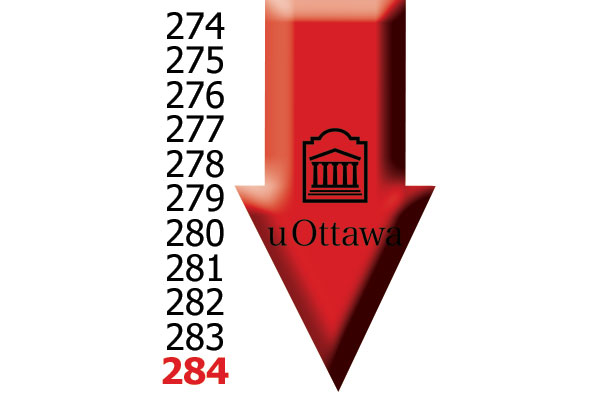University drops 66 places in QS ranking
Photo: Kim Wiens
The University of Ottawa dropped 66 places to 284th in the annual QS rankings, one of the most influential ranking systems in the world.
Its ranking also dropped among Canadian universities, from 11th to 13th.
U of O spokesman Patrick Charette said in an email that the school’s drop was partly due to a change in the way the rankings are calculated.
“We understand that the QS Rankings made the decision to dilute the very important ‘academic citations in life sciences’ category,” said Charette. “As a result, our ranking has changed significantly.”
“We are disappointed by this change as it does not properly reflect our strengths and excellence,” he said.
But Simona Bizzozero, a spokeswoman for QS, told the Ottawa Citizen that only 30 per cent of the drop was caused by this change, the rest being due to “a genuine deterioration in some indicators.”
The Massachusetts Institute of Technology (MIT) was ranked first, while McGill university was the highest-ranked Canadian school, coming in at number 24. The University of Toronto, traditionally considered the best in Canada, claimed the number 34 spot on the list.
Carleton was ranked in the mid-500 range, with little change from last year.
Of course, the QS isn’t the only prestigious university ranking system.
“For 4 consecutive years, the University of Ottawa has been ranked among the top 200 universities worldwide by Times Higher Education (THE) World University Rankings,” Charette said in an email. The U of O currently sits at number 188.
The THE gives a heavy weighting to citations, or the number of academic papers produced at a university (30 per cent). QS gives 20 per cent for citations in most categories, though it’s now less for “life sciences”.
International university rankings are relatively new, as both QS and THE started up in 2004. But they are becoming very important for universities looking to attract students and partner with other schools.
In the 2011 book Rankings and the Reshaping of Higher Education, author Ellen Hazelkorn argues that the impact can be widespread.
According to her analysis, rankings can influence the funding schools receive from their governments and determine which schools are desirable for partnerships. Universities in Brazil, for example, will generally not work with universities that don’t have top 500 status.
It can even affect immigration—in the Netherlands and Denmark, graduates from top universities face less stringent immigration requirements.
For the U of O, the rankings are important for promotion and as a measure of performance.
“Our University still ranks among the best universities in Canada and uOttawa researchers continue to excel,” said Charette.




